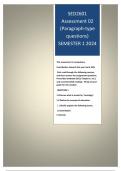SED2601
Assessment 02
(Paragraph-type
questions)
SEMESTER 1 2024
This assessment is compulsory.
Contribution towards the year mark: 40%
First read through the following sources,
and then answer the assignment questions.
Prescribed textbook (SoE): Chapters 1 to 2,
and recommended readings Wrap-around
guide for this module.
QUESTION 1
1.1Discuss what is meant by “sociology”.
1.2 Define the concept of education.
1.3 Briefly explain the following terms:
a) Assimilation
b) Society
, SED2601
Assessment 02 (Paragraph-type questions)
o This assessment is compulsory.
o Contribution towards the year mark: 40%
First read through the following sources, and then answer the assignment questions.
Prescribed textbook (SoE): Chapters 1 to 2, and recommended readings Wrap-around guide for
this module.
QUESTION 1
1.1 Discuss what is meant by “sociology”. (3)
Sociology is the scientific study of society, social interactions, and social structures. It examines the
development, organization, and functioning of human societies, as well as the relationships and
interactions between individuals within these societies. Sociology seeks to understand how social
factors such as culture, social class, race, gender, and institutions influence human behavior and
shape the structure of societies.
Sociologists study various social phenomena, including social inequality, social change, social
institutions, and social movements. They use research methods such as surveys, interviews,
observations, and statistical analysis to gather data and analyze social patterns and dynamics.
Overall, sociology provides a framework for understanding and analyzing the complexities of human
society and the factors that drive social behavior, relationships, and organization. It also helps to
identify and address societal issues and challenges, and to contribute to the development of policies
and practices that promote social well-being and cohesion.
1.2 Define the concept of education. (3)
Education is the process of acquiring knowledge, skills, and values through systematic instruction,
study, and practical experience. It is a lifelong journey that empowers individuals to grow personally
and professionally, and to contribute to society in meaningful ways. Education encompasses formal
schooling, as well as informal and non-traditional learning opportunities.
1.3 Briefly explain the following terms:
a) Assimilation (1)




